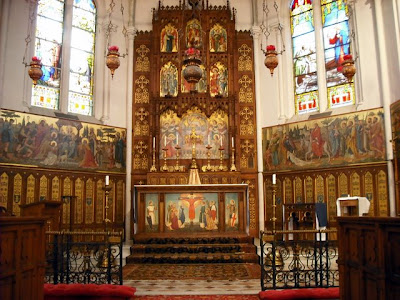St Andrew's Pau: A beautiful building is home to a vibrant international community
The town of Pau in the Pyrenees once had three Anglican Churches: Christ Church (sold to the French Reformed), Holy Trinity (now a cinema) and the beautiful St Andrew's (above), which continues to be a thriving parish, under the leadership of its priest the Revd Ian Naylor.
The building is a fine example of the architecture promoted by the Cambridge Camden Society, a consciously medieval design, which was thought by the leaders of the Oxford movement to be the most dignified style for the Church's worship. The Church is adorned with some beautiful ironwork, wood carvings, sanctuary paintings and a splendid reredos.
But the parish is more than its beautiful building. The community, once largely British, is now very international. Some are retired and live in Pau or the surrounding region. Some are living and working in Pau, including a large number of families from Nigeria, who are employed by the oil company, Total. The Sunday eucharist is the centre of the Church's life, and the hospitality and fellowship following is an essential part of building community when people travel sometimes up to 2 hours to attend the service. There is a Sunday Club for Children, run by the reader Mrs Irene Brindle, as well as house groups scattered about the region. In the past year or so, St Andrew's has founded a daughter congregation in Condom, where a service is held each Thursday. In addition St Andrew's takes a full part in the ecumenical life of the region.
On the First Sunday of Advent baptism and confirmations were celebrated. The candidates are pictured below. Fr Naylor, the parish priest is on the left.
The parish has an attractive website here.
The building is a fine example of the architecture promoted by the Cambridge Camden Society, a consciously medieval design, which was thought by the leaders of the Oxford movement to be the most dignified style for the Church's worship. The Church is adorned with some beautiful ironwork, wood carvings, sanctuary paintings and a splendid reredos.
But the parish is more than its beautiful building. The community, once largely British, is now very international. Some are retired and live in Pau or the surrounding region. Some are living and working in Pau, including a large number of families from Nigeria, who are employed by the oil company, Total. The Sunday eucharist is the centre of the Church's life, and the hospitality and fellowship following is an essential part of building community when people travel sometimes up to 2 hours to attend the service. There is a Sunday Club for Children, run by the reader Mrs Irene Brindle, as well as house groups scattered about the region. In the past year or so, St Andrew's has founded a daughter congregation in Condom, where a service is held each Thursday. In addition St Andrew's takes a full part in the ecumenical life of the region.
On the First Sunday of Advent baptism and confirmations were celebrated. The candidates are pictured below. Fr Naylor, the parish priest is on the left.
The parish has an attractive website here.





Impressive profile...I live in Oakville. ON, so aware of your schools. I am interested in St Andrew's, because my 2nd GGrandfather Rev. Richard Wright died in Pau, Nov. 1863.
ReplyDeleteI wasn't aware that there were two other Anglican Churches there. Would you know if they were Anglican
when my ancestor died in 1863?
Thanking you in advance for any response.
Regards,
David Cox
In 1863, they were still Anglican, as far as I know. The records should be held at the Guildhall in London.
Delete